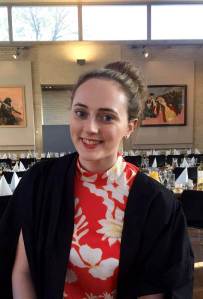 Some people see beauty in the works by the great Masters of the Renaissance or in the words of Shakespeare, but I see beauty in the cellular world. It’s only when you sit back, slow down and look that you see what seems so simple is in fact a complex network of interdependent pathways and processes formed with such intricacy that it is frankly unbelievable it - and by extension life - exists at all. Science is much more than a body of knowledge; it is a way of thinking, looking and analysing - so perhaps not so different from the study of art or literature.
Some people see beauty in the works by the great Masters of the Renaissance or in the words of Shakespeare, but I see beauty in the cellular world. It’s only when you sit back, slow down and look that you see what seems so simple is in fact a complex network of interdependent pathways and processes formed with such intricacy that it is frankly unbelievable it - and by extension life - exists at all. Science is much more than a body of knowledge; it is a way of thinking, looking and analysing - so perhaps not so different from the study of art or literature.
What distinguishes the sciences from other disciplines is its universal application and connectivity.
An understanding of how a virus can evade the host immune system by down-regulating cellular stress responses through the production of unique factors not only facilitates the development of targeted viral therapies but also allows the system to be exploited to treat other diseases. At first it seems counter intuitive to use a highly virulent engineered virus to treat cancer but the reality is that it is possible. The successful development of such treatment requires an understanding of the pathology of the virus and the cancer, the biochemical basis of the virus and how it can be manipulated, pharmacological trials and combination therapies - and of course medical practice. With this it is clear to see the importance of appreciating and utilising the bridges that join one discipline to another.  The natural sciences course at Cambridge truly embraces this ethos, providing a broad grounding in the sciences on which specialisation can be built throughout the undergraduate course. I’m currently starting to specialise in the biochemical fields, with papers in Pathology, Pharmacology and Biochemistry and Molecular Biology. The first year course provides a solid grounding in the basics - making these papers highly accessible to students without a biological background at A-level: in fact there are relatively few mandatory requirements for most papers.
The natural sciences course at Cambridge truly embraces this ethos, providing a broad grounding in the sciences on which specialisation can be built throughout the undergraduate course. I’m currently starting to specialise in the biochemical fields, with papers in Pathology, Pharmacology and Biochemistry and Molecular Biology. The first year course provides a solid grounding in the basics - making these papers highly accessible to students without a biological background at A-level: in fact there are relatively few mandatory requirements for most papers.
There really is nowhere better to study sciences, I’ve been to lectures given by Nobel prize winners and people at the cutting edge of their field.
However, it can be challenging, when your lecturer is speaking at 100 miles an hour as you’re flicking through the handout for the right pages - which never seem to be in order - and scribble down something that sounds useful, to appreciate the beauty, intricacy and finesse of what you’re being told and with that, what drew you here in the first place. Issy Pearce-Mason Undergraduate student